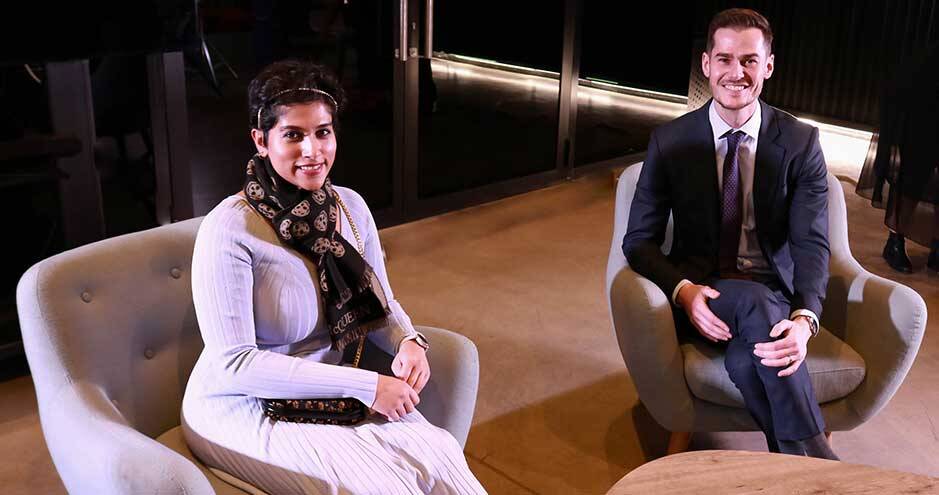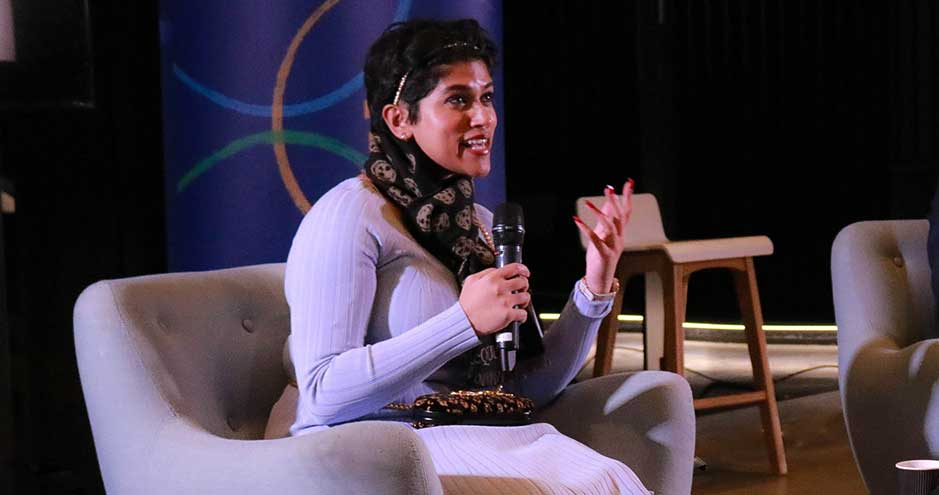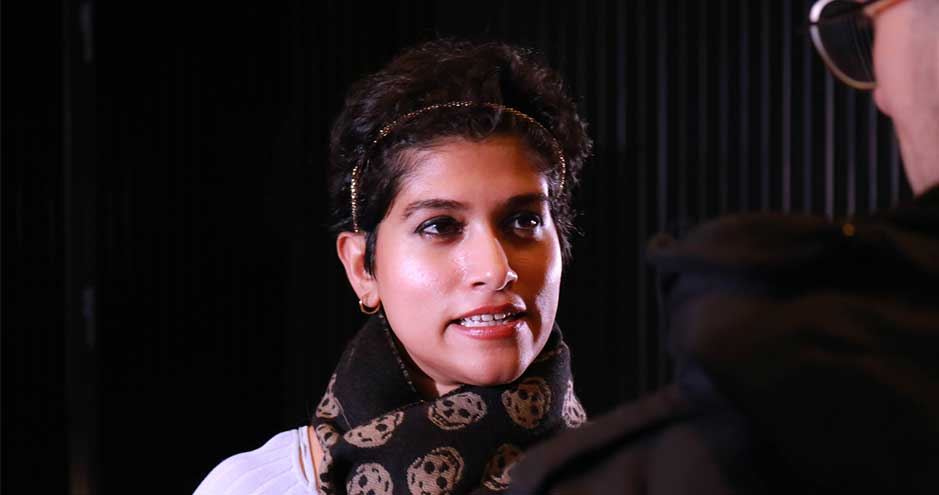Behind the Anti-fraud Takedowns by Short Seller Fahmi Quadir
One of the world’s most successful short-only hedge funders, Fahmi Quadir, was the keynote speaker at a January 26 research workshop entitled “Frauds in Capital Markets: the Role of Short Sellers”. It was jointly organized by the HEC Society &Organizations Institute (S&O) and the CFA Society France. The event in central Paris was orchestrated by HEC Associate Professor Luc Paugam, specialist in corporate whistleblowing. In the course of a long interview, Quadir shares with us the keys to taking down fraudulent majors like Valeant and Wirecard.

© Rebecca Auber
Few would have imagined the twists and turns American mathematician Fahmi Quadir has experienced after graduating in 2012, simply garnered with a maths and a biology degree from California’s Harvey Mudd College. Least of all the protagonist herself. “I admit, never in my wildest dreams did I think I’d end up a hedge fund manager focused on fraud identification,” she says as she sits below the imposing dome of Station F in central Paris. “In fact, it was opposite to anything I ever hoped to achieve in life. Growing up, I was very socially progressive. I would read Karl Marx. I was unashamed in my very liberal, very left wing views, not just on social but also economic values. So I felt that my principles really conflicted with those of Wall Street.”
Quadir gives a steely look and then chuckles reassuringly. One finds it difficult to equate the persona to the nicknames she’s been attributed for her travails like The Assassin and The Femme Fatale of Short Selling. Or the headlines she’s provoked: Wirecard’s Most Dangerous Opponent. And Wall Street’s Most Reviled Investors, where Quadir is seen by the New York Times as the unheralded leader of a band of short sellers making a living out of “digging up dirt on big companies”.
Forensic Plunge into Company Records
When the 31-year-old sums up the activities which have dominated her life and Saftkhet Capital Management - the company she founded in 2017 and named after Seshat, the ancient Egyptian goddess of mathematics and accounting - it hardly sounds like cloak-and-dagger stuff: “We’re a short only fund in New York and London. That means we exclusively bet against the price of companies going down. These potential investments are based on deep investigative work to find situations where a company might be misleading the market, committing fraud, engaging in unethical or predatory business practices.”
Quadir continues: “We are conducting forensic research on companies, diving deeper after our fundamental analysis of their financial statements.” The devil is in the detail: “We try to identify what we feel are vulnerabilities. Some might be structural within the business. Some may be financial holes or misrepresentations in their financial statements. Or it may just be something wrong with how that company is conducting business or portraying it.”
Quadir and her sole collaborator, Christina Clementi, then work like surgeons: “We capture those vulnerabilities. We really dig in, identify the questions we need to ask in order to gain conviction in our thesis. And then we come up with something that is purely simple and elegant. At the end, I should be able to explain to you why I am shorting that company in a single sentence. It is simple because, at the end of the day, we’re talking about very simple things, we’re talking about money and it should never require hundreds of pages of explanation.” After countless hours sifting through business documents, Quadir then looks at how the price could evolve in the market should the company’s nefarious discoveries be confirmed. And she swoops, buying the targeted firm’s stock at a lower price before delivery.
Transitting to Short Selling
Quadir’s matter-of-fact description of the work needed to bring fraudulent business practices to task belies the intensity of her research. In the space of a few years, the results have been equally intense. The New Yorker of Bangladeshi heritage was first part of the take-down of the pharmaceutical giant formerly known as Valeant and then helped short the German Wirecard company, as shown in various high-profile documentaries.
But what exactly made Quadir plunge into this high-pressure work? To explain, she retraces her upbringing in the midst of the 2008 financial crisis which saw her father laid off from the banking profession. The experience still nourishes her distaste for financiers who “gambled with people’s money” and “took excessive risks”. Quadir slowly plotted a path that conjugated her love of numbers and abstract mathematical problems with her desire to change the money-centered fields which destroyed her father. “When I was just a teenager Jim Simons, founder of one of the best hedge funds at the time, Renaissance Technologies, provided a me a research grant to conduct research in biophysics. And, then, after graduating I became involved with the Museum of Mathematics which – you guessed it - was funded by the same Jim Simons. Serendipity? I don’t know, but it was there that I realized that there was a path forward for me within finance.” She pauses: “Of course, that didn’t mean I would have to abandon my values. In fact, I viewed it as taking subversive action using capital markets in a way to affect change. Basically, to make markets fairer for all.”.
Pollyanna No More
Quadir’s passion for mathematics had initially led her to start a PhD in algebraic topology . But it also opened the door to research work for one of the world’s Top 5 pharmaceutical companies: “I helped design a data-driven model for them which pointed out shortages across factories for chemicals used in drugs. The model became so good the companies’ annual budget would have a line dedicated to the opportunistic revenue that was driven by it. But instead of using it to meet the shortages, they hiked the prices up. Well, that was the rage moment for me and it carried through to my understanding of healthcare and the pharmaceutical industry. Because, more than most corporations, pharmaceutical companies should exist to serve us, the customer, the citizens. I was scandalized at this gross misusage of a model I’d designed. Till then, I’d always been a Pollyanna sort of person, imagining science and medicine would combine for the common good. In the long run, you could say this shock set me on the road to short selling.”
It was Australian investor John Hempton who identified certain qualities Quadir possessed which, as he says, “made (her) a natural as a short seller”: “I guess he saw the lengths I’d go to in my research and just pulled me in,” she says. “But he also saw a deeper motivation: that I viewed short selling as a subversive action, using capital markets in a way to affect change and make them fairer. In general, that’s what short sellers need and don’t have enough of - a motivation other than money. Because, if you think about what we do, it’s countercyclical. So, on a long time scale, we’re always going to be up against the market and in a position where we can lose money. Finding that motivation within you is necessary to have longevity in this game.”
I evoke Hempton’s claim that Quadir incarnated a unique approach to short selling. Does her training in mathematics, for example, single her out from other short sellers? She pauses as if she’d never been asked. “Well, I’ve always been an outsider within my peer group. No other short seller really looks like me and they certainly don’t have the same background. If you go and read any profile on my peers, it will mention testosterone or masculinity at least once. So, just as a woman, I come to the table with different perspectives. Then, there's the way I was raised, never taking no for an answer, fighting for what I wanted. In my journey from academic researcher to hedge fund manager and short seller, I never compromised on what I always was, my core values have always remained the same. And that’s the guiding light.”
From Valeant to Wirecard
The resilience and principled approach brought Quadir early rewards. At 25, she shot to fame by successfully betting against Valeant, an investigation which Netflix turned into a documentary five years ago. In the years of detective work on the company’s files, she applied the foundational approach she used in mathematics: asking the right questions and proposing the most elegant answers: “With Valeant, I was not interested in explaining the acquisition accounting. Valeant built their business model on acquiring drugs, raising the price to the point where people could no longer afford them and the balance sheet was so upside down they couldn't keep this going. The simple fact was the business model was broken.”
Another asset Quadir feels is priceless is a fresh pair of eyes. These were invaluable in her take-down of Wirecard, a German payments company she put a short on in early 2018.“That was also a case of existential faults with the business model. This was a company built on high risk payment processing. But after Wirecard obtained a banking license, it became much bigger than any company using such a high risk approach. I needed to look at what changed in the story over a period of time. It was critical to understand that timing. Again, here was an example of a model being fundamentally broken. What they were saying was not what the numbers were showing. From the evidence we uncovered, we believed this was driven by money laundering. Money laundering gives you lots of volume and the risks don’t really exist, since no one is going to cry foul against themselves. We had to understand at what point the risks become too great to the money launderers. That’s when individuals start pulling their funds out of the system, at which point Wirecard is likely to collapse. And it did, like a house of cards – the money was no longer there to inflate the business.”
Filtering Out the ‘Noise’
The price Quadir has had to pay for taking down such major company has at times been extreme. She has been physically attacked (“probably with brass knuckles”), insulted on line and in mainstream media, threatened countless times, followed, prosecuted, hacked and had her server attacked. “I’ve learnt one thing over time: you can never be too paranoid as far as the lengths people will go to stop the work you do. You quickly realize that there are definitely risks involved in this game. You have to remain skeptical and on your toes constantly.” How does she live with these threats and abuse? “I tend to filter out any noise that gets in the way of my objectives,” she says euphemistically. “When people say what I do is despicable, I know that their anger is rooted in basic human psychology. Most people out there don’t understand my job and can’t get their heads around the idea that I am making bets against businesses that I believe are conducting fraud. None of us want to believe that we can be defrauded or lied to. And I don’t think any amount of PR or goodwill will change the public perception of short sellers. People have always hated the short seller and they'll probably continue to do so in the future.” No wonder she once told a journalist: “Yes, I have faced terrible harassment, but I was always in a position to tell those who belittled me to fuck off.”
Fortunately, Quadir has a strong support network (including her lawyer sister) and she admits she has no sense of fear. "I find it crazy to think I’m harassed for doing my job.” She has also found precious allies in the media, as seen throughthe work by journalists Dan McCrum (FT) and Roddy Boyd (Foundation of Financial Journalism),. “The media is critical to what I do because I believe journalists are the most effective and credible storytellers. If I can get a reporter to see my thesis and independently corroborate my work, then it just gives me greater conviction that my research isn’t simply my bias and my cynicism. I really respect the job journalists do and I think it’s very much aligned with what I do as a short seller. Of course, they’re not motivated by money like short sellers, they’re more concerned about morality and reputation. I’m an investor, a market participant, not a journalist.”
Attempts to Ban Short Selling
The efforts to unmask business’ darker side has also had political repercussions. Germany’s securities regulator BaFin has revamped its entire organization and agreed to investigate the Wirecard saga. “Once there is a major public financial scandal regulators often take a much harder stance on corporate crime in general,” Quadir underlines. “BaFin has brought in a new head whom I have a lot of respect for. They’ve implemented new protocols for people like me, encouraging us to contact them with concrete evidence of misdemeanors. Their latest investigation drive is a positive step. What remains to be seen is whether this policy will carry through another market cycle. Because regulators still remain financial archeologists and only conduct post-mortems on fraud. Fundamentally, they don’t want to get in the way of prosperity, even if it involves turning a blind eye to fraud.”
Quadir’s caution is better understood in the wake of past experience. In February 2019, the same BaFin banned short selling in Wirecard to put an end to short sales - what the regulator called “anti-market practices”. The investor still rankles over the ruling: “How did this come to be? What were the motivations there? Was it because of regulatory capture?” Quadir wonders. And she extrapolates: “Banning short selling is this emotional, reactionary mechanism some politicians may lean on. When there is chaos in the markets, regulators don’t really understand what they can do so they simply try to stop it. It’s a feel-good thing. They’re showing the public that they are trying to do something about the markets collapsing. But the reality is most regulators are very educated , sophisticated people, they know what they’re doing. When they reach for things like short-selling bans, it’s purely political, as I said, it’s reactionary. Regulators should know better because the data has shown time and time again that restricting short selling activity is actually harmful for markets. It’s harmful for price discovery for liquidity. When a market is in crisis, who is the natural buyer? It’s me because I have to cover my shorts, so banning short sales never makes sense.”
Setting Up Shop in London
Nevertheless, Quadir believes lessons have been learnt: “I even got apologies from those within the Ministry of Finance in Germany about the entire debacle. It’s my hope that at least in the US and Europe we know better and won’t resort to bans or any other regulations against short sellers.”
Europe has drawn Fahmi Quadir in more ways than one. A few years ago, she set sail east and is now settled in London. How does it compare to New York? “Oh, it’s a much smaller community, there are fewer people doing what I do, so you tend to hear things quicker. New York is very professional, everyone’s very much suited, you have frequent investor dinners and idea sharing. But it’s a lot of peacocking. Whereas I feel London is a bit more casual and, also, I think more sincere in doing the research and the work. I’m appreciating it, it’s actually charming being a short seller in London. I find it easier to motivate myself beyond just capital markets. Again, this isn’t just about my work and my ability to find things to short.” And the ebullient hedge funder returns to her mantra: “It’s ultimately about having a fairer business world, a more transparent economy for the global good.”
Banks, Liability and Dieselgate
Earlier in a day devoted to fraudulent markets, four HEC academics presented their latest research linked to corporate misconduct and liability. HEC Assistant Professor in Accounting, Albert Mensah and Hervé Stolowy analyzed the impact of activist short selling on banks which have established lending relations with shorted firms, focusing on loan pricing. Their groundbreaking research is drawn from a sample of 2,400 US firms. It appears to show that banks have much to learn from the short sellers who influence the interest rate they charge to shorted firms. HEC Management Professor Julien Jourdan, meanwhile, shared his exploration of Dieselgate and its impact on Volkswagen. Through his analysis of 1.2 million tweets before and after the scandal broke, Jourdan underlined the moral and social issues the company has faced ever since the affair made global headlines in 2015.
Finally, Finance Associate Professor Guillaume Vuillemey explored the origins of limited liability and the balancing act needed to offset safety demands and investor irresponsibility. This is part of his long-term research into risk management and the regulation of financial markets.

